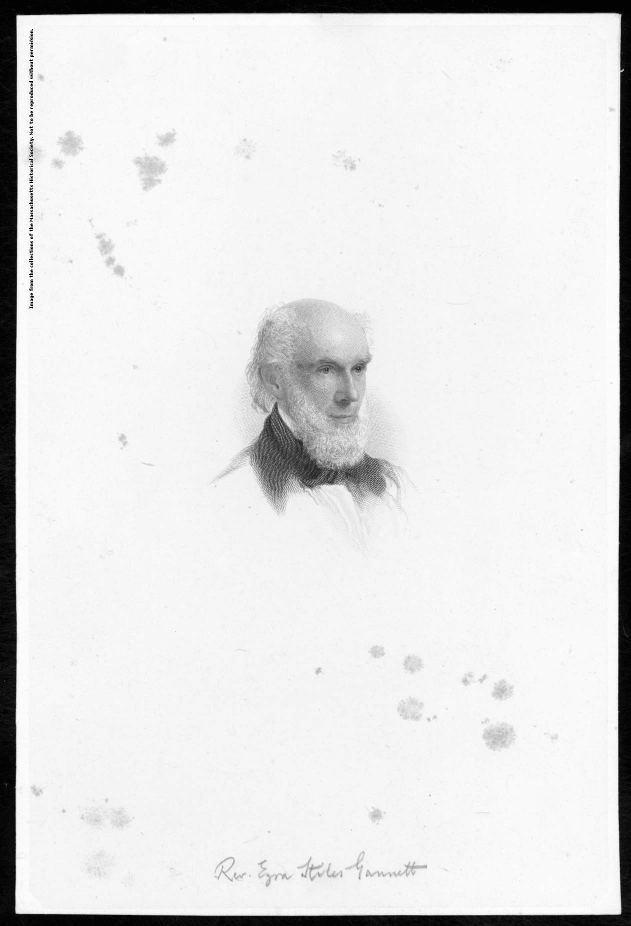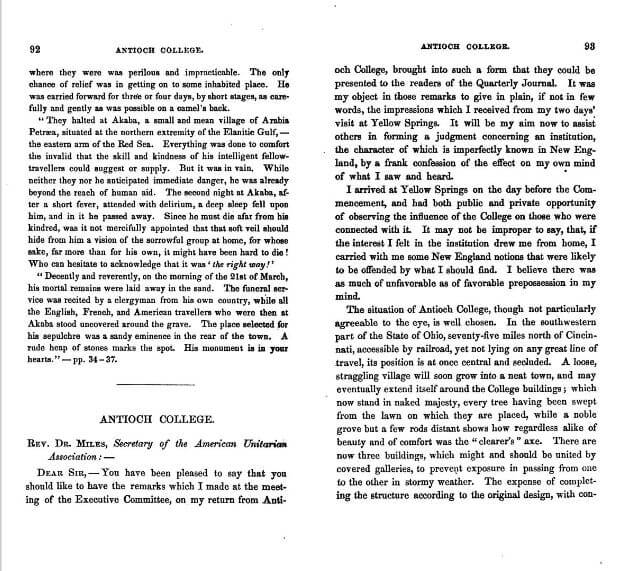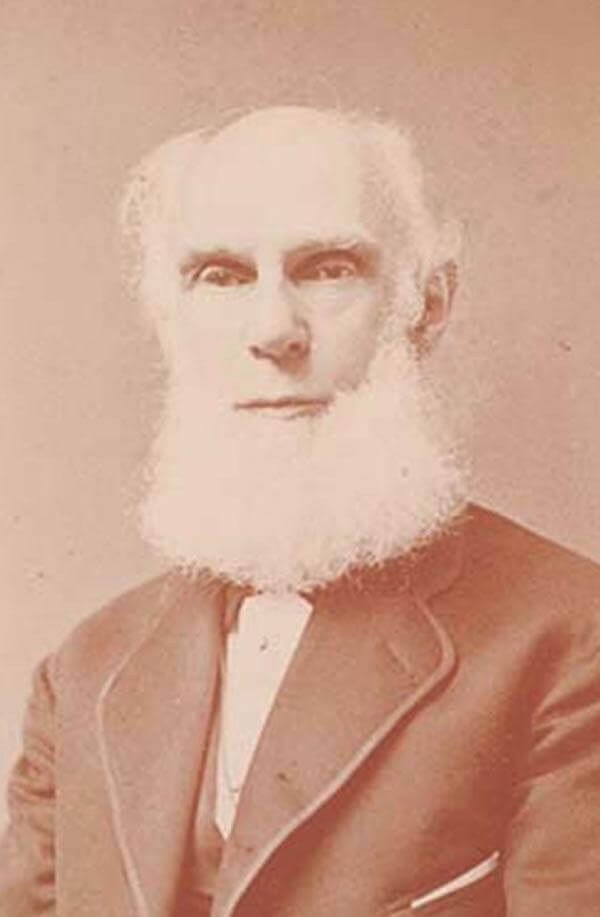Antioch College’s long relationship with the Unitarian-Universalist Association actually predates Antioch College itself. There might not have ever been an Antioch at all had the Unitarian Association and the College’s founding denomination, the Christian Church, found themselves not so like-minded as either suspected. This realization occurred on the Board of Trustees of Meadville Theological School, established in 1844 as a joint venture when the Christians realized that perhaps they should educate their ministers before sending them out into the world. At issue was a statement by Henry W. Bellows, a prominent Unitarian minister of New York, that “the Christian denomination with its thousand ministers, almost identical in opinion with us, if we will take charge of their theological education, will become one with ourselves.” The Reverend John Ross responded with a letter to the editor of The Christian Palladium in July 1845, saying: “We have not yet approximated sufficiently near to denominational Unitarianism to grow giddy in view of the awful gulf below or the vast elevation above us.” Fearing they might be “swallowed up” by their Unitarian friends, in 1848 the Christians withdrew from Meadville and struck out to establish a college of their own.

Though they undoubtedly hoped to get as far away from Unitarian influence as possible with their new college, it would not be long before the Christians’ old nemeses began showing up in Yellow Springs. Indeed, the most timeless comment on Horace Mann’s inaugural address of 5 Oct 1853, that it contained enough inspiration to make a college flourish in the Sahara, was uttered by a Unitarian minister in attendance, the Rev. T. Starr King. Unitarian interest in Antioch College focused not only on its famous first president, long a friend of their free religious ideas, but more importantly on Antioch’s twin founding principles, coeducation and nonsectarianism, revolutionary bulwarks that made the College as many admirers as it did detractors. The nonsectarian part in particular made Eastern Unitarians enthusiastic about Antioch’s future, and the desire to preserve that unique outlook is what attracted their support, which culminated in a $100,000 gift to the endowment given in 1865.

A key agent in garnering that support was the Reverend Ezra Stiles Gannett (1801-1871), a Boston based Unitarian minister and one of the founding figures of the American Unitarian Association. In 1857 Gannett made the journey to Ohio to observe directly the self-styled “Little Harvard of the West” on the occasion of its first Commencement. His report to the UA (so voluminous that Gannett’s conclusion admits that his “anticipation of condensing this report of my visit to Antioch into a few paragraphs has been entirely defeated, by a desire to give, not only my impressions, but the grounds on which they rest.”) was published in its Quarterly Journal, and judged by Mann to be “of inestimable price” in terms of its value to the College. Another Antioch supporter wrote to Gannett that “no man could do as much as you have done to propitiate the good-will and confidence of the Unitarian body toward the Institution.” Selections follow from the Gannett Report, as it has become known, but the entire document is available in Antiochiana and the Quarterly Journal for 1857 can be found online at archive.org at https://archive.org/details/quarterlyjourna04commgoog/mode/2up.

Excerpted from “Report of a Visit to Antioch College,” Reverend Ezra Stiles Gannett to Reverend Dr. Miles, Secretary of the American Unitarian Association, Quarterly Journal of the Unitarian Association, vol. 5, #1, 1857.
Dear Sir,—You have been pleased to say that you should like to have the remarks I made at the meeting of the Executive Committee, on my return from Antioch College, brought into such a form that they could be presented to the readers of the Quarterly Journal. It was my object in those remarks to give in plain, if not in few words, the impressions which I received from my two days’ visit at Yellow Springs. It will be my aim now to assist others in forming a judgment concerning an institution, the character of which is imperfectly known in New England, by a frank confession of the effect on my own mind of what I saw and heard.
I arrived at Yellow Springs on the day before the Commencement, and had both public and private opportunity of observing the influence of the College on those who were connected with it. It may not be improper to say, that, if the interest I felt in the institution drew me from home, I carried with me some New England notions that were likely to be offended by what I should find. I believe there was as much unfavorable as of favorable prepossession in my mind.
The most obvious peculiarity of Antioch is the enjoyment by both sexes of the privileges, and their subjection to the restraints, of academical life on perfectly equal terms. This feature of the institution has awakened in many minds much a doubt of the wisdom of its managers, that nothing but long and entire success will overcome their distrust. The experience of four years may not be thought sufficient to settle so grave a question. Yet I cannot but think that a visit to Yellow Springs would go far towards changing the opinion so common at the North in regard to the impropriety, if not impracticability, of such a union of the sexes. I certainly went there without any prejudices in its favor, and expecting to see much which would justify a separation which we deem both safer and more decorous. But as for safety, decorum, propriety, or practicality, I saw nothing which would warrant the slightest doubt or fear.
The other most remarkable peculiarity of this western institution is the disuse of emulation as a motive of study or good behavior. “Rank” is ignored. No one takes precedence over another….Whatever jealousies or disappointments that grew out of the rivalry allowed or encouraged in almost all other seminaries, are here unknown, or at least kept out of sight. Yet there is no want of interest in the purpose for which the young people are here assembled within the college halls. The spirit of study is as prevalent and as strong as in any similar institution. It has been shown that prizes and honors, competition and fame, are not necessary to awaken the love of knowledge, or to sustain the effort for its acquisition. The value of this example I cannot but regard as almost inappreciable.
You will probably infer from these remarks, that I was gratified with the moral condition of Antioch. So far as I could judge, it seemed to me satisfactory and admirable. Practices with which I had always been familiar in our Eastern colleges, and which I had been told were ineradicable, were banished from the place…In the address delivered by President Mann, at the close of the Commencement exercises, a position was taken, and maintained with equal clearness of expression and strength of argument, which, if enforced in almost any one of the older colleges in the country, would cause an outcry of apprehension, lest it should be ruined by a decrease in the number of its students. Yet how can our colleges become what they should be, while they hesitate to accept this position? Affirming that a college had no right to send our graduates into the community, with its virtual recommendation, unless they were correct in life, he declared that no person of immoral or vicious habits should ever receive a diploma from his hand.
…The college is neither directly nor indirectly committed to the support of any theological tenets. If the Christians and Unitarians alone have shown an interest in its success, it is because they alone have approved of its care in avoiding sectarian proclivities. It throws its doors open to all who seek the means of intellectual culture, and it disowns or dislikes only those who lead an immoral life. It makes no attempt to convert any student to a particular form of religious belief, and regards all sects with an impartial indifference. It is this position, so unlike that taken by the other literary institutions near it, that should give to Antioch a special import in our eyes, and does give it a special advantage in its relations to the part of the country in which it is situated.
Antioch is not a Unitarian institution, and should not be made such. By assuming a denominational attitude it would forfeit its relations to the free intellectual activity of the West. It can best promote the diffusion of Unitarian sentiment by faithfulness to its unsectarian position…Our interest in the prosperity of Antioch is heightened by the experiment which will there be tried for the benefit of the whole country.
